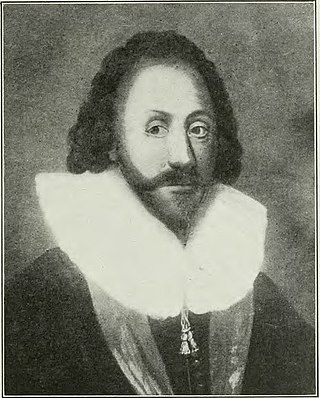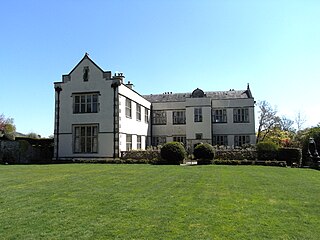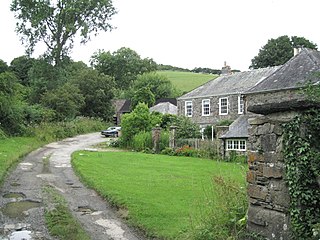
Sir John Fowell, 3rd Baronet (12 December 1665 – 26 November 1692) of Fowelscombe in the parish of Ugborough [2] in Devon, was an English politician who sat in the House of Commons from 1689 to 1692.

Sir John Fowell, 3rd Baronet (12 December 1665 – 26 November 1692) of Fowelscombe in the parish of Ugborough [2] in Devon, was an English politician who sat in the House of Commons from 1689 to 1692.
Fowell was the son and heir of Sir John Fowell, 2nd Baronet (1623–1677), of Fowelscombe, by his wife Elizabeth Chichester (d.1678), a daughter of Sir John Chichester (1598-1669) of Hall [3] in the parish of Bishop's Tawton in Devon, Member of Parliament for Lostwithiel in Cornwall in 1624.
He inherited the baronetcy on the death of his father in 1677. [4] In 1689 Fowell was elected Member of Parliament for Totnes in Devon, and sat until his death in 1692. [5] He was one of the 151 MPs who voted against making the Prince of Orange king, but in favour of declaring Princess Mary queen. [4]
Fowell died unmarried at the age of 26 when the baronetcy became extinct. [4] His heirs were his two surviving sisters, who until 1711 held the Fowell estates of Fowelscombe and Ludbrooke in co-parcenary: [6]
In 1711 a division of the estates took place, with Fowelscombe going to the Champernowne family, which held it until 1758, [10]
Bowden is a historic estate in the parish of Yealmpton in Devon, England. From the 15th century until 1748 the manor house was for eight generations the seat of a junior branch of the Copleston family of Copplestone. The manor house was largely rebuilt in the 19th century and, together with some of its outbuildings, now serves as a farmhouse.

The Fowell Baronetcy, of Fowellscombe in the County of Devon, was a title in the Baronetage of England. It was created on 30 April 1661 for Edmund Fowell of Fowelscombe in the parish of Ugborough, Devon, previously Member of Parliament for Ashburton. The second Baronet also represented Ashburton in Parliament. The third Baronet was Member of Parliament for Totnes. The title became extinct on his death in 1692.

Paul Speccot of Penheale in the parish of Egloskerry in Cornwall, was a Member of Parliament successively for Bossiney, East Looe and Newport all in Cornwall, between 1626 and 1640.

Sir Thomas Wise, KB, of Sydenham in the parish of Marystow and of Mount Wise in the parish of Stoke Damerel in Devon, was Sheriff of Devon in 1612 and in 1621 served as a member of parliament for Bere Alston in Devon.

Sir John Fowell, 2nd Baronet of Fowelscombe in the parish of Ugborough in Devon, was thrice elected a Member of Parliament for Ashburton in Devon, between 1659 and 1677. He fought in the Parliamentary army during the Civil War and following the Restoration of the Monarchy was appointed in 1666 by King Charles II Vice-Admiral of Devon.

Sir Edmund Fowell, 1st Baronet of Fowelscombe in the parish of Ugborough in Devon, was a Member of Parliament for Ashburton in Devon from 1640 to 1648.

Fowelscombe is a historic manor in the parish of Ugborough in Devon, England. The large ancient manor house known as Fowelscombe House survives only as an ivy-covered "romantic ruin" overgrown by trees and nettles, situated 1 mile south-east of the village of Ugborough. The ruins are a Grade II listed building.

Woodleigh is a village, parish and former manor located in the South Hams region of the county of Devon, England.

Sir Edmund Prideaux, 1st Baronet (1554–1628), of Netherton in the parish of Farway, Devon, was a Councellor at Law and Double Reader of the Inner Temple and was created a baronet on 17 July 1622. He purchased the estate of Netherton where in 1607 he built a new mansion house, known today as Netherton Hall, a grade II listed building. He was one of John Prince's Worthies of Devon.

Potheridge is a former Domesday Book estate in the parish of Merton, in the historic hundred of Shebbear, 3 miles south-east of Great Torrington, Devon, England. It is the site of a former grand mansion house re-built by George Monck, 1st Duke of Albemarle (1608–1670) circa 1660 on the site of the former manor house occupied by his family since at the latest 1287. It was mostly demolished in 1734 after the death of the widow of his son Christopher Monck, 2nd Duke of Albemarle.
Matford is an historic estate in the parish of Alphington, near Exeter, Devon. It should not be confused with Matford in the parish of Heavitree, almost immediately opposite on the other side of the River Exe.

Bableigh is an historic estate in the parish of Parkham in North Devon, England. It is separated from the village of Parkham by the Bableigh Brook. It was the earliest recorded seat of the Risdon family in Devonshire, from which was descended the Devon historian Tristram Risdon.

Netherton in the parish of Farway in Devon is an historic estate situated about 3 1/2 miles south-east of Honiton. The present mansion house known as Netherton Hall was built in 1607 in the Jacobean style, restored and rebuilt 1836-44, and is a Grade II listed building.
Arthur Champernowne (?1683–1717), of Dartington, Devon, was an English politician who sat in the House of Commons from 1715 to 1717.

Sharpham is an historic estate in the parish of Ashprington, Devon. The Georgian mansion house, known as Sharpham House, overlooks the River Dart and is a Grade I listed building. The house was commenced in about 1770 by the Royal Navy captain Philemon Pownoll to the designs of the architect Sir Robert Taylor (1714–1788). In the opinion of Nikolaus Pevsner it contains "one of the most spectacular and daring later 18th century staircase designs anywhere in England". The park and gardens are Grade II* listed in the National Register of Historic Parks and Gardens. Part of the descent of Sharpham is shown on the Palmes family heraldic pedigree roll.

Sir William Davie, 4th Baronet (1662–1707) of Creedy in the parish of Sandford, near Crediton in Devon, inherited the Davie baronetcy and the Davie estates from his elder brother Sir John Davie, 3rd Baronet (1660–1692), MP for Saltash 1679–85 and Sheriff of Devon in 1688, who died unmarried at the age of 32.

Montagu Edmund Parker (1737–1813) of Whiteway House, near Chudleigh and of Blagdon in the parish of Paignton, both in Devon, was Sheriff of Devon in 1789. Portraits of him by Sir Joshua Reynolds and John Downman survive at Saltram House.

Luscombe is an historic estate situated in the parish of Rattery in Devon.
The manor of Broad Hempston was a historic manor situated in Devon, England, about 4 miles north of Totnes. The present village known as Broadhempston was the chief settlement within the manor and remains the location of the ancient parish church of St Peter and St Paul.

John Woolcombe (1680–1713) of Pitton in the parish of Yealmpton in Devon, was a Member of Parliament for Plymouth in Devon 1702–5, and served as Sheriff of Devon in 1711–12.